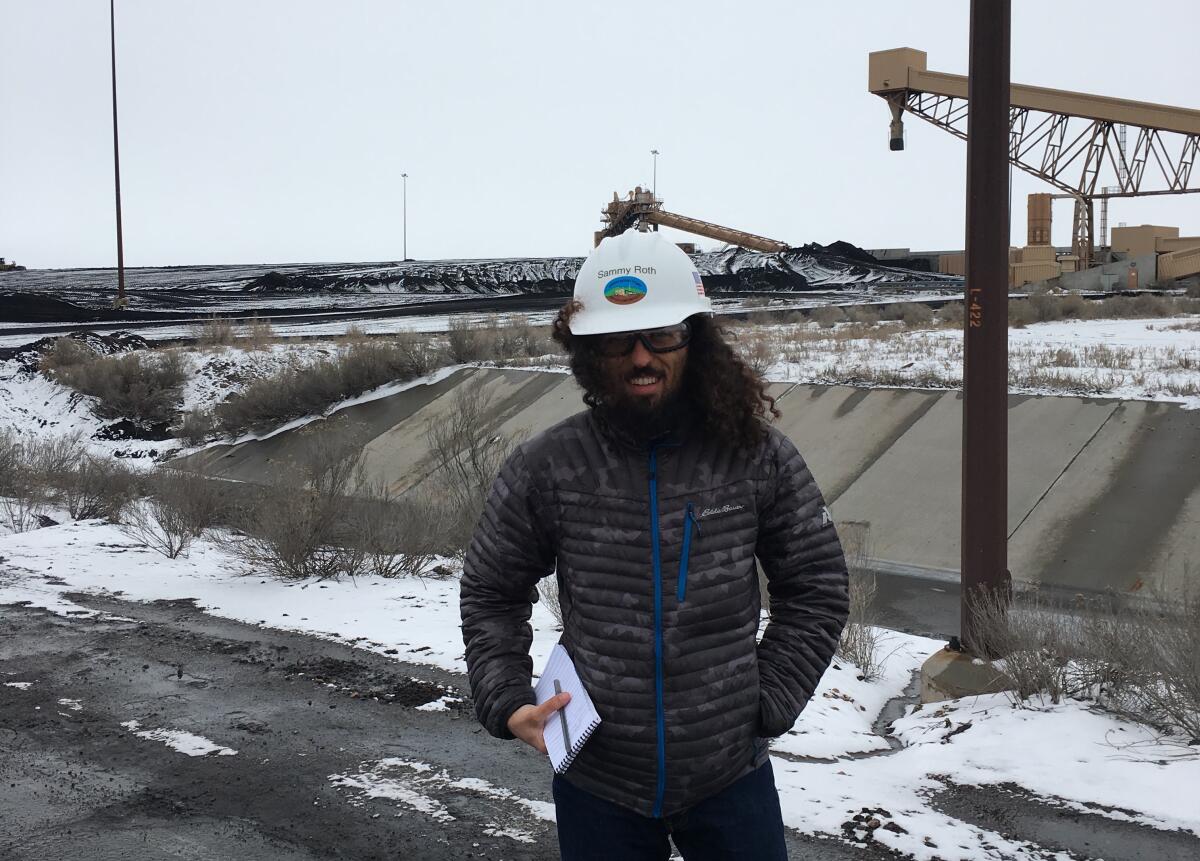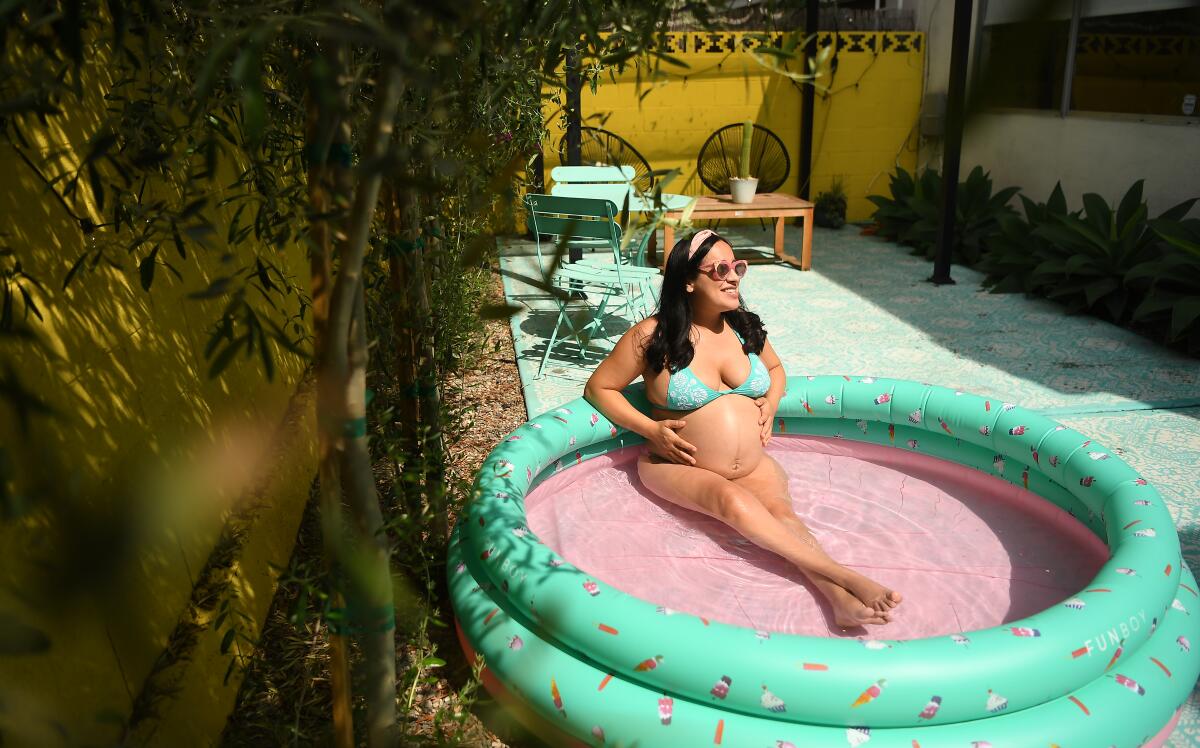Newsletter: A ‘boiling point’ on environmental issues

- Share via
Good morning, and welcome to the Essential California newsletter. It’s Thursday, May 7, and I’m writing from Los Angeles.
Sign up for Essential California
The most important California stories and recommendations in your inbox every morning.
You may occasionally receive promotional content from the Los Angeles Times.
For the last six years, my colleague Sammy Roth has been on the energy and climate beat, first for the Desert Sun and USA Today — where he focused on renewable energy, climate change and public lands — and now at The Times, where he’s focused specifically on energy since late 2018.
If you care about California’s role as a climate leader, clean energy investments or how the state’s largest power companies have dealt with bankruptcy, fires and blackouts, you’ve probably already encountered Sammy’s work.
And if you know anything about the city of Los Angeles’ contested plan to wean itself off the last of its coal-generated electricity by replacing that fuel with a climate-polluting natural gas plant in Utah, it’s almost definitely because of Sammy’s reporting.
As drought, wildfires and rising seas continue to batter the state, climate and energy is far from a niche beat. If you live in California, these topics will affect your life. Period.
Which is why Boiling Point, Sammy’s new weekly newsletter about climate change, energy and the environment in the American West, is so important. It’s about the air you breathe, the water you drink and the energy that powers the device you’re reading these words on right now.
Why start an environment-focused newsletter in the middle of a once-in-a-century pandemic? That’s a fair question, and one Sammy addresses right off the bat.
Climate change hasn’t stopped just because so many of us are sheltering in place, but the virus will add new challenges to ongoing problems. 2020 is already shaping up to be one of the hottest years on record. With millions of people potentially self-isolating in homes and apartments they can’t keep cool, public health experts are warning that the pandemic could make intense heat waves deadlier. And drought conditions in Northern California may prompt an early start to this year’s wildfire season, forcing local authorities to rethink the typical logistics for how fire crews are housed and how residents are evacuated.
Our oceans. Our public lands. Our future.
Get Boiling Point, our newsletter exploring climate change, energy and the environment, and become part of the conversation — and the solution.
You may occasionally receive promotional content from the Los Angeles Times.
And now, here’s what’s happening across California:
California will make it easier for essential workers who contract COVID-19 to obtain workers’ compensation benefits. Gov. Gavin Newsom signed an executive order that streamlines claims and establishes a rebuttable presumption that any essential workers infected with COVID-19 contracted the virus on the job. Los Angeles Times
L.A. County officials have laid out the first steps toward easing stay-at-home orders imposed almost two months ago. Florists, car dealers and various types of bricks-and-mortar stores — including those that sell toys, music, books, clothing and sporting goods — will be allowed to open for curbside pickup only starting Friday. In-store shopping will not be permitted.
County recreational amenities including golf courses and trails will also reopen Friday. City golf courses and trails will reopen Saturday, with the exception of Hollywood’s perennially crowded Runyon Canyon trail, which will remain closed. Los Angeles Times
Wait, you might be thinking, didn’t Gov. Newsom already outline all of this a few days ago? Yes, Newsom laid out the framework, but the county and city of L.A. could still have chosen to wait longer before easing their restrictions. That’s what’s happening in the Bay Area. Citing rising coronavirus cases, San Francisco city officials reiterated Wednesday that the region’s stay-at-home orders will continue to be enforced — and those orders don’t currently permit curbside pickup from nonessential retailers. Los Angeles Times
L.A. STORIES
After criticism, the L.A. County Board of Supervisors will allow real-time public comment at its virtual meetings. According to Supervisor Janice Hahn’s office, the public will now be able to call in for one hour at the beginning of the meeting. Los Angeles Times
Whoever said kiddie pools were just for kids? With temperatures in the 90s this week and much of the coastline effectively shut down, many adult Angelenos are seeking relief with inflatable pools set up on the pavement around their homes. Los Angeles Times

Will Hollywood background actors disappear when films restart production? “Already threatened by the advancement in special effects that create computer-generated crowds, the background acting community is bracing for possible extinction in the wake of COVID-19.” Deadline Hollywood
Twelve pandemic habits our writers hope stick around permanently in L.A., from takeout drinks to connections with strangers. Los Angeles Times
Enjoying this newsletter?
IMMIGRATION AND THE BORDER
A detainee from Otay Mesa Detention Center has died of COVID-19, making him the first detainee in ICE custody nationwide to die of COVID-19. Carlos Ernesto Escobar Mejia would have been 58 this month. According to his sister, Escobar Mejia had been living in the U.S. since the family fled El Salvador during the civil war in 1980. Los Angeles Times
POLITICS AND GOVERNMENT
Are you ready to be a warrior? It might cost you your life. In recent days, President Trump begun describing citizens as “warriors” in the battle against the pandemic and suggested some of those fighters might have to die if that will help boost the economy. Los Angeles Times
Students accused of sexual misconduct will get stronger protections under new federal rules. Education Secretary Betsy DeVos has unveiled sweeping changes to campus sexual misconduct rules that would bolster the rights of the accused and give colleges more flexibility in how they handle Title IX cases. Los Angeles Times
“Phone interviews with lawmakers all start with the same disclaimer now: I apologize in advance for the screaming child. He’s fine, he’s supervised.” My D.C.-based colleague Sarah D. Wire writes about how covering Congress has changed since the pandemic. Los Angeles Times
CRIME AND COURTS
Former Rep. Duncan Hunter and prosecutors have asked the court to delay the start of his prison sentence to as late as Jan. 4 in light of the COVID-19 pandemic. Los Angeles Times
HEALTH AND THE ENVIRONMENT
“We are not disposable.” Meet the Bay Area nurses who are battling the coronavirus pandemic, often at great personal peril. San Francisco Chronicle
L.A. health officials to travelers: Your vacation is not essential. As scattered states, some national parks and a few Northern California counties begin to reopen, the L.A. County Public Health Department would like to remind you that only essential trips are allowed. And a road trip or a camping excursion is not considered an essential activity amid the coronavirus outbreak. Los Angeles Times
CALIFORNIA CULTURE
What a reopened California will look like: From restaurants and bars to retail, personal care, movie theaters and sports, experts and business owners across the consumer economy are thinking about what a reopened world will look like — and how it’ll affect their bottom lines. Los Angeles Times
“OK, first of all, I’m stuck in a viral tinder-box, a cruise ship indeterminately docked in a prison yard ... But what’s going on at a deeper level?” From inside a Central California prison, Johnny Angel Martinez writes about his day-to-day experiences, wrestling with fear and hope during the pandemic. Voices of Monterey Bay
Lockdowns, the oil slump and the closure of a federal prison that was a major employer are all affecting Taft, a city in the southwest corner of the San Joaquin Valley. Los Angeles Times
The layoffs at Airbnb cast a dark shadow over Silicon Valley: Airbnb, seen until recently as one of Silicon Valley’s most financially secure “unicorns,” is laying off a quarter of its staff. Recode
NOT EVERYTHING IS TERRIBLE
Drive-throughs and drive-ins were fading. But coronavirus has made them a lifeline, where bubbles of normalcy can be found. Los Angeles Times
A load of history: On Monday, the U.S. Supreme Court made history by allowing for its first-ever live broadcast of arguments. And they made history again on Wednesday, when — for the first time ever — someone appeared to take a bathroom break while participating in a Supreme Court argument by phone. Yes, we are talking about an errant and audible toilet flush, the source of which remains unknown. CNN
A poem to start your Thursday: “Debtors” by Jim Harrison. The Writer’s Almanac
Free online games
Get our free daily crossword puzzle, sudoku, word search and arcade games in our new game center at latimes.com/games.
CALIFORNIA ALMANAC
Los Angeles: partly sunny, 91. San Diego: partly sunny, 80. San Francisco: sunny, 71. San Jose: sunny, 87. Fresno: sunny, 93. Sacramento: sunny, 94. More weather is here.
AND FINALLY
Today’s California memory comes from Lenore Brashear:
Panorama City. 1960s. Hot nights in summer. Window air conditioner at top speed can’t drown out the boy around the corner practicing ‘Light My Fire’ on his guitar every night, all night, it seemed. Mocking birds in the palm trees competed with him. Winters, when the dips at every intersection filled with water. Don’t drive too fast, you’ll drown out your car motor. If you stall the water runs over the running boards and into the car. The bar by Griffith Park. Ian and Sylvia sang live. ‘Leavin’ on a Jet Plane.’ So much in so little space?
If you have a memory or story about the Golden State, share it with us. (Please keep your story to 100 words.)
Please let us know what we can do to make this newsletter more useful to you. Send comments, complaints, ideas and unrelated book recommendations to Julia Wick. Follow her on Twitter @Sherlyholmes.
Sign up for Essential California
The most important California stories and recommendations in your inbox every morning.
You may occasionally receive promotional content from the Los Angeles Times.




